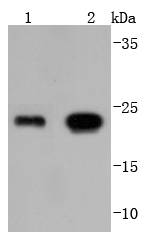Product Detail
Product NameGlutathione Peroxidase 1 Rabbit mAb
Clone No.JJ092-07
Host SpeciesRecombinant Rabbit
Clonality Monoclonal
PurificationProA affinity purified
ApplicationsWB, IP
Species ReactivityHu, Ms, Rt
Immunogen Descrecombinant protein
ConjugateUnconjugated
Other NamesAL033363 antibody Cellular glutathione peroxidase antibody Glutathione peroxidase 1 antibody Glutathione peroxidase antibody GPx 1 antibody GPx-1 antibody GPX1 antibody GPX1_HUMAN antibody GPXD antibody GSHPx-1 antibody GSHPX1 antibody MGC14399 antibody MGC88245 antibody
Accession NoSwiss-Prot#:P07203
Uniprot
P07203
Gene ID
2876;
Calculated MW22 kDa
Formulation1*TBS (pH7.4), 1%BSA, 40%Glycerol. Preservative: 0.05% Sodium Azide.
StorageStore at -20˚C
Application Details
WB: 1:1,000-1:2,000
Western blot analysis of Glutathione Peroxidase 1 on different lysates using anti-Glutathione Peroxidase 1 antibody at 1/1,000 dilution. Positive control: Lane 1: HepG2 Lane 2: THP-1
Glutathione peroxidase (GPx) enzymes are generally selenium-containing tetrameric glycoproteins that help prevent lipid peroxidation of cell membranes. GPx enzymes reduce lipid hydroperoxides to alcohols, and reduce free hydrogen peroxide to water. GPx members are among the few proteins known in higher vertebrates to contain selenocysteine, which occurs at the active site of glutathione peroxidase and is coded by the nonsense (stop) codon TGA. There are eight GPx homologs (GPx-1-8). GPx-1, Gpx-2 and Gpx-3 exist as homotetramers. Gpx-4 has a high tendancy to form high molecular weight oligomers. GPx-1 plays an important role in the antioxidant defense of the vascular wall and neural cells in response to oxidative stress. GPx-2 is the major isoform in the lungs and its basal or inducible expression is dependent on Nrf2. GPx-3 is under regulation by hypoxic stress and the expression and deficiency of GPx-3 is associated with cardiovascular disease and stroke. GPx-5 is selenium-independent; it is bound to the acrosome of sperm, where it may protect sperm from premature acrosome reaction in the epididymis.
If you have published an article using product 49298, please notify us so that we can cite your literature.



 Yes
Yes



